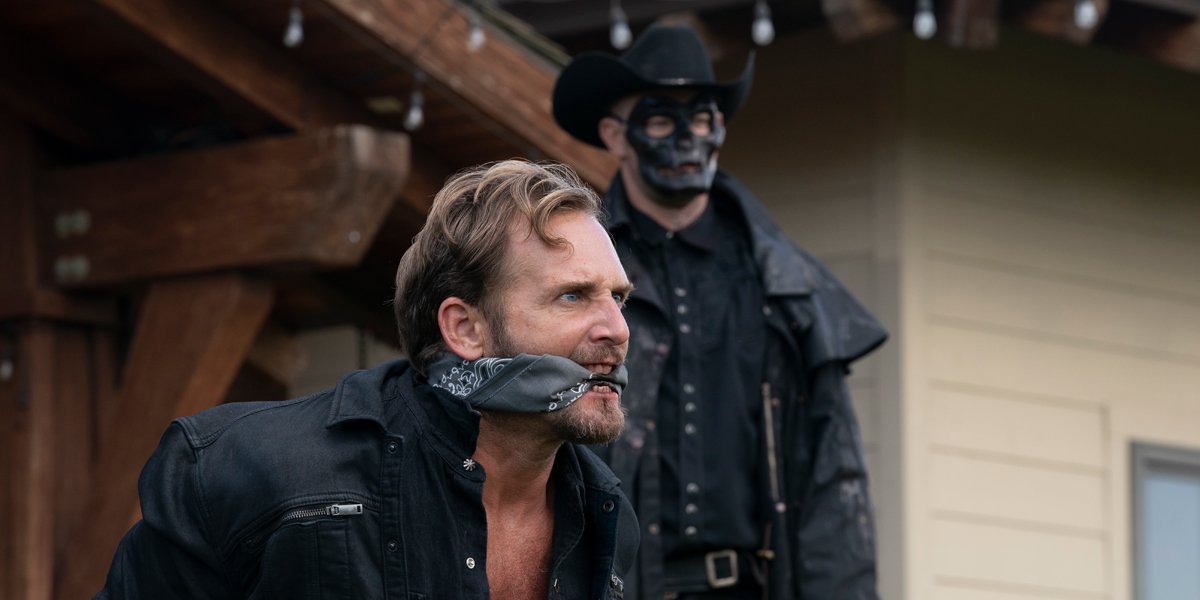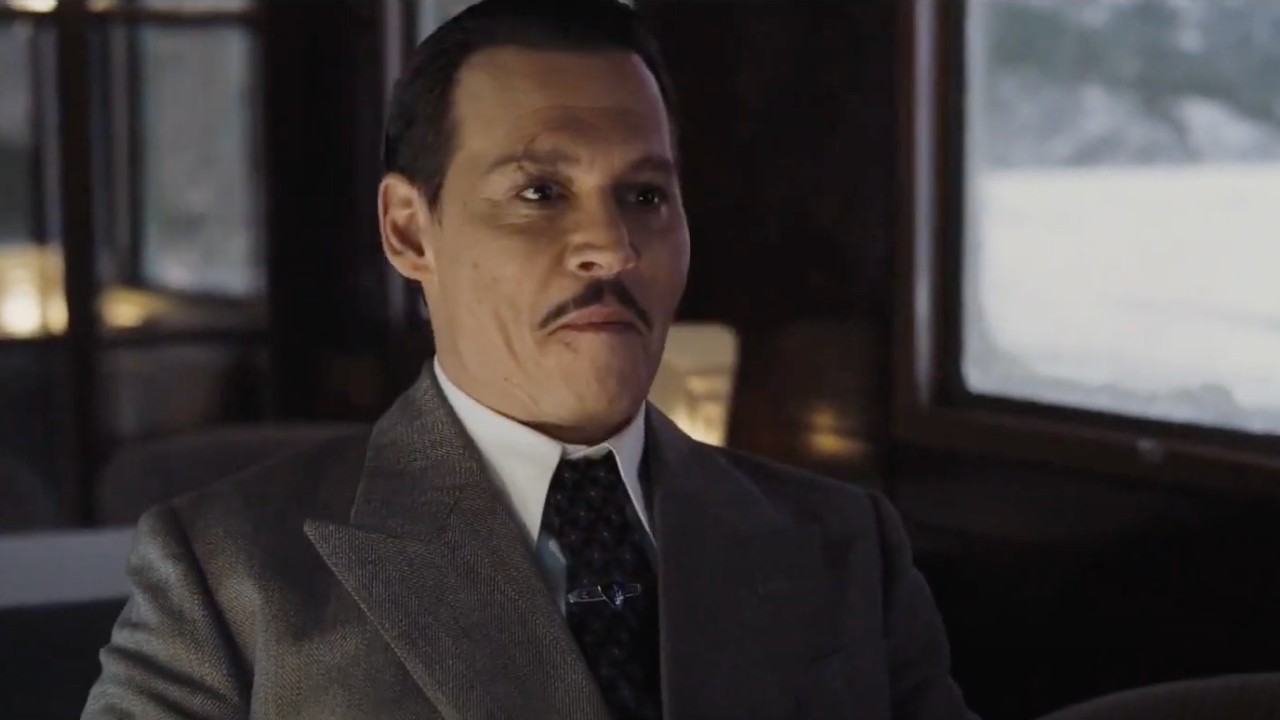Because the central premise of the Purge franchise is so strong, the most interesting variable in its evolution has been the sequels’ shifting focus to different narratives and the choices made of what stories to tell. This was something that the series had to learn the hard way, as the home invasion setup of the first chapter doesn’t allow for a proper exploration of the themes at the core of the macro concept, but writer/director James DeMonaco made smart adjustments with his follow-ups – resulting in the superior The Purge: Anarchy (which brought the action out into the streets) and The Purge: Election Year (which went more overt with the politics of the concept).
The fourth installment, Gerard McMurray's The First Purge, was arguably a misstep, as the prequel doesn’t have the same energy as its predecessors and doesn’t fully capitalize on its opportunity to shift audiences’ perspectives about the fictional world – but now the ship has been righted with Everardo Gout’s The Forever Purge. It’s a sequel that not only adds further complexity to the ideas at the core of the franchise, engaging in fresh topical discussions, but does so while also intensifying the standard stakes and cranking up the darkness.
Fans will remember that The Purge: Election Year ends with Elizabeth Mitchell's Senator Charlene Roan becoming president and removing the New Founding Fathers of America from power – abolishing The Purge as one of her first acts in office – but The Forever Purge opens with a disheartening time jump: after Roan’s administration, the NFFA returns to the executive branch, and the annual 12-hour period of consequence-free crime is reestablished.
The first Purge after its reinstatement also happens to be the first experienced by Adela (Ana de la Reguera) and Juan (Tenoch Huerta), a Mexican couple who flee to the United States in hopes of escaping a drug cartel. After a few months in they are able to establish their lives in Texas, and while there are some wonderful people who help them out, such as sympathetic ranch owner Caleb Tucker (Will Patton), there are others, such as Caleb’s son Dylan (Josh Lucas), who aren’t shy about showing their disdain for them.
Then the nightmare begins. The annual Purge starts, and as per usual people act like raving psychotics when given the opportunity. Members of the community work together to help make sure everyone is protected, but, of course, nobody ever feels safe until the horns blare nationwide announcing that the period of controlled chaos is over.
There is a collective sigh of relief the next morning when the horrible annual event is concluded, and people set out to have what they expect to be a typical day– but as things turn out, there is nothing typical about it. Rather than being satisfied with just a 12-hour Purge, a massive underground organization executes a coordinated effort nationwide to keep the lawlessness rolling and perpetual: a Forever After Purge. Adela, Juan, Dylan, and others come together fearing for their lives, and a race begins to try and get to the Mexican border and escape the country before it’s too late.
The Forever Purge changes things up in big ways story-wise, and the changes work.
While the previous Purge films have all been set in different locations and followed characters of different demographics, there has been a sameness to all the stories in that they are all primarily set during the eponymous horror show – but one of the most thrilling things about The Forever Purge is the way that it breaks out of that pattern. Similar to how heroes can wait for safe haven from daybreak in a vampire movie, the past installments have all possessed a kind of built in safety net for the protagonists in the knowledge that eventually the Purge will end. What was a kind of vampire movie becomes a kind of zombie movie with exponentially rising chaos here, and it’s damn effective.
It only takes the new sequel 30 minutes to play out its “official” Purge, fitting some effective terror and violence in that abbreviated affair, and after that point you really don’t know what’s coming next. From the unexpected comes surprisingly strong structure, and it executes some interesting world-building while always maintaining an intimate and tense atmosphere.
With greater stakes and broken rules, The Forever Purge is darker and scarier than its predecessors.
In addition to being the weakest movie from a narrative standpoint, The First Purge is also the weakest in the scares department – but The Forever Purge is a recalibration, and presses down on the intensity gas pedal. It gets off to a rough start, as a prologue with Adela and Juan’s border crossing is built around cheap and unnecessary jump scares, but that proves not to be representative of what the film has to offer as a new addition to the horror genre. It turns out that psychopaths who can’t keep their violent tendencies holstered for just 12 hours a year are far scarier than those who can, and the movie throws some freaky threats at the protagonists – adorned with some equally freaky masks.
Ana de la Reguera is a standout who hopefully sees more action in future installments.
Things get a bit clunky when it comes to the social commentary that the sequel swings for with its ensemble, getting a bit on the nose in its discussion of racial integration (let’s be real: subtly has never been a big priority in these movies), but the characters are engaging despite their lack of real complexity. That being said, just as Frank Grillo’s Leo Barnes became a series standout in The Purge: Anarchy, Ana de la Reguera’s Adela proves to be a new and exciting hero for the canon, with a compelling backstory that is only previewed, and plenty of potential still left to be untapped by the end of the film.
There isn’t what could be called a wonderful history when it comes to the fourth sequel in horror franchises: does anyone think of A Nightmare on Elm Street 5: The Dream Child, Halloween 5: The Revenge of Michael Myers, or Saw V as being the pinnacles of their respective series? Considering that, however, The Forever Purge is a bit of a game-changer, as it is one of the best Purge movies yet. While a lot of scary concepts are run into the ground by the time a fifth feature enters production, this movie shows that there is still plenty to explore in the world James DeMonaco has created, and it builds anticipation for future chapters.

Eric Eisenberg is the Assistant Managing Editor at CinemaBlend. After graduating Boston University and earning a bachelor’s degree in journalism, he took a part-time job as a staff writer for CinemaBlend, and after six months was offered the opportunity to move to Los Angeles and take on a newly created West Coast Editor position. Over a decade later, he's continuing to advance his interests and expertise. In addition to conducting filmmaker interviews and contributing to the news and feature content of the site, Eric also oversees the Movie Reviews section, writes the the weekend box office report (published Sundays), and is the site's resident Stephen King expert. He has two King-related columns.
Next Summer Is Going To Be All About Tom Holland, And I Need Everyone To Start Coming Up With A Fun Spider-Man Version Of Barbenheimer Now
Everybody Knows Michael Rooker Is Great, And It Kills Me That The Righteous Gemstones Took Four Seasons To Introduce This Stellar Character
Johnny Depp Looks Like A Different Person In The First Look From His Day Drinker Movie











